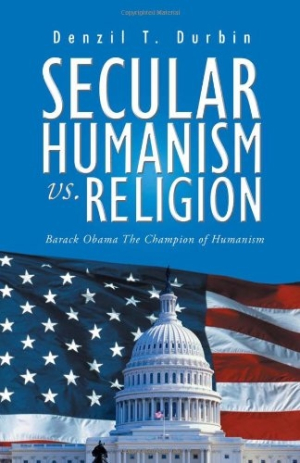
Secular Humanism vs. Religion
Barack Obama, the Champion of Humanism
In Secular Humanism vs. Religion: Barack Obama The Champion of Humanism, Pastor Denzil T. Durbin decries secular humanism and makes an appeal for the United States to return to what he considers its religious roots. Writing with political fervor, Durbin’s appeal gets lost in the passion of his politics.
From the opening chapters, Durbin comes out swinging, defining the humanist ideology and how its focus on man and not God flies in the face of religion. He then details the origins of humanism, tracing its ideas back to Greek philosophers and Renaissance freethinkers. In counterpoint, Durbin defines Christian fundamentalism by saying that “humanists place human progress and not God at the center of their thinking.” Using this basis, he then discusses the humanist perspective on hot-button issues such as abortion and euthanasia. Durbin condemns humanists for keeping God out of the schools; he believes that their pleasure-seeking lifestyle is ruining America’s values.
While his organization is strong and his writing clear, Durbin muddies his argument by relying more on emotion than fact. For instance, he writes, “The secular humanist has always been a destabilizing force. Whenever they rise to power, chaos always follows, and the people suffer inhumanely … Christianity on the other hand exalts people; every person in the world is treated as he counts for something.” But throughout this passage, there are no specific examples of how humanism caused suffering; neither are there examples of how Christianity exalts people. Durbin doesn’t use any sources to back up his own points.
Durbin’s zeal heats up when he discusses President Obama over several chapters. The author looks at the president’s rise to power and discusses what he believes to be humanist, Islamic, and Marxist influences on his political decisions. Once again, Durbin’s argument falters here because it lacks facts. Other than a passing reference to Fox News and to President Obama’s memoir, Dreams of my Father, Durbin doesn’t provide sources for his argument in these chapters. Even the references section at the back of the book skips over these chapters.
It’s clear that Durbin loves America and wants to warn everyone of the dangers he sees. He writes, “As you read this book, it’s my greatest hope that you will entertain ideas that you have never, never considered before.” To succeed, Durbin should have provided more in-depth political analysis and credible, diverse sources beyond those that can be found in a bookstore or on the Internet. Durbin also needs to choose his focus: either secular humanists or the president. While his criticism of humanism does lead to his discussion of the current administration, the link is not strong enough to merit President Obama’s name in the subtitle of the book.
Nonetheless, religious conservatives may see the work as a nice addition to the fundamentalist library, while political junkies may find Durbin’s argument interesting. But when it comes to changing the perspective of humanists and Americans in general, Durbin may find his passions leave him clinging to the audacity of hope.
Reviewed by
Katerie Prior
Disclosure: This article is not an endorsement, but a review. The publisher of this book provided free copies of the book and paid a small fee to have their book reviewed by a professional reviewer. Foreword Reviews and Clarion Reviews make no guarantee that the publisher will receive a positive review. Foreword Magazine, Inc. is disclosing this in accordance with the Federal Trade Commission’s 16 CFR, Part 255.
